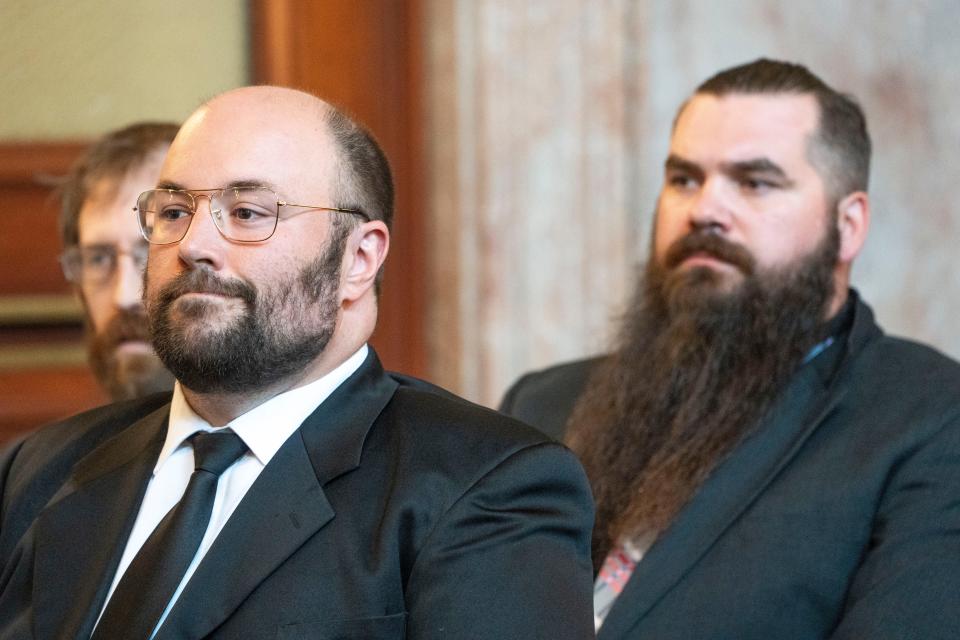Polk County judge rules Libertarian congressional candidates can't appear on Iowa ballots
A Polk County judge has ruled that three Iowa Libertarian congressional candidates cannot appear on ballots this fall, upholding the decision of a state panel that removed them last week.
The Libertarian Party plans to appeal the decision to the Iowa Supreme Court, which will need to act quickly to resolve the case in time for ballots to be printed later this month.
The three Libertarian nominees — Nicholas Gluba in the 1st District, Marco Battaglia in the 3rd District, and Charles Aldrich in the 4th District — faced challenges to their candidacies last month from Republican voters who said the Libertarian Party failed to comply with the law when it held its caucuses and county conventions on the same night in January.

The State Objection Panel sided with the challengers, voting 2-1 to remove the three candidates from the ballot. The Libertarians then appealed to court and made their arguments to Polk County District Court Judge Michael Huppert on Thursday.
Huppert upheld the State Objection Panel's decision in a ruling Saturday, dismissing the Libertarian candidates' appeal. The decision means that, unless the Supreme Court rules otherwise, that there will be no Libertarians on the ballot this fall in Iowa's 1st, 3rd and 4th congressional districts.
"Clearly we disagree with the decision and are disappointed," Jules Cutler, chair of the Libertarian Party of Iowa, said Saturday. "What the court just allowed is the last minute gamesmanship by one party who holds the trifecta in our political branches to remove competition from the general election ballot."
At issue in the case was the fact that the Libertarian Party held its county conventions on the same night as its precinct caucuses on Jan. 15, in violation of state law that says county convention delegates don't begin their terms until the day after they are chosen.
The Libertarian Party also failed to notify county auditors of the results of its precinct caucuses, including the names of the people elected as county convention delegates, as required by state law.
More: Libertarian candidates argue to judge to get back on Iowa ballot. When will a ruling come?
The Libertarian Party made several arguments for why it believes the issues did not merit being removed from the ballot.
The Libertarian Party argued that the Iowans who objected to the three congressional candidates did not have standing to do so because the objectors are all Republicans. But Huppert said Iowa Code Chapter 43.24 allows anyone to challenge a candidate as long as they have the right to vote for that candidate.
The Libertarians also argued the State Objection Panel went beyond its authority by delving into the party's convention procedures, rather than limiting itself to issues related to the candidate's nominating papers or certificate of nomination, which are spelled out in the law.
Huppert said in his ruling that the law allows challenges to the "legal sufficiency" of a nomination certificate issued by a party.
"The 'legal sufficiency' of any nominating document must necessarily involve something other than the content of that document," he wrote. "It is therefore logical to conclude that it must include whether the proper procedures required under the law were followed in generating that document."
Alan Ostergren, an attorney representing the Republican voters who challenged the Libertarian candidates, said in court Thursday that the Libertarian Party failed to follow the basic rules that parties must obey when nominating candidates.
"The Libertarians have never suggested, they have never shown, that somehow it was impossible for them to comply with their obligations to do basic party organization tasks," he said. "They simply didn’t do it."
The Libertarian Party argued that it substantially complied with the law because it still held county conventions, even though those conventions took place on the same day as its caucuses.
But Huppert said the law requires political parties to strictly comply with its requirements, and that substantial compliance is not enough.
"In this case, the statute establishes the beginning of the authority of a delegate to a county convention by setting the first date upon which the delegate’s term begins," he wrote. "This is clearly a provision that goes to the essence of what a delegate can and cannot do; they have no authority to act on behalf of the party until their term begins."
Huppert said in his ruling that the procedures required by the law for nominating candidates to the ballot do not burden the Libertarian Party's First Amendment rights of free association because the law applies equally to all parties.
"The process is not weighed against the Libertarian Party — to the contrary, it is applicable to any group that qualifies as a major party under Iowa law," he wrote.
Iowa's ballots must be printed before Sept. 21 — the date when military and overseas ballots must be mailed to voters under federal law.
Early voting for all other voters begins Oct. 16. The election is Nov. 5.
Stephen Gruber-Miller covers the Iowa Statehouse and politics for the Register. He can be reached by email at [email protected] or by phone at 515-284-8169. Follow him on Twitter at @sgrubermiller.
This article originally appeared on Des Moines Register: Libertarian Congress candidates won't be on Iowa's ballot, judge rules
Solve the daily Crossword

